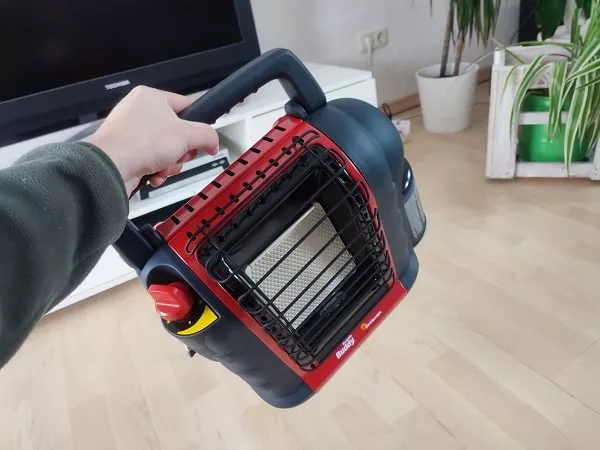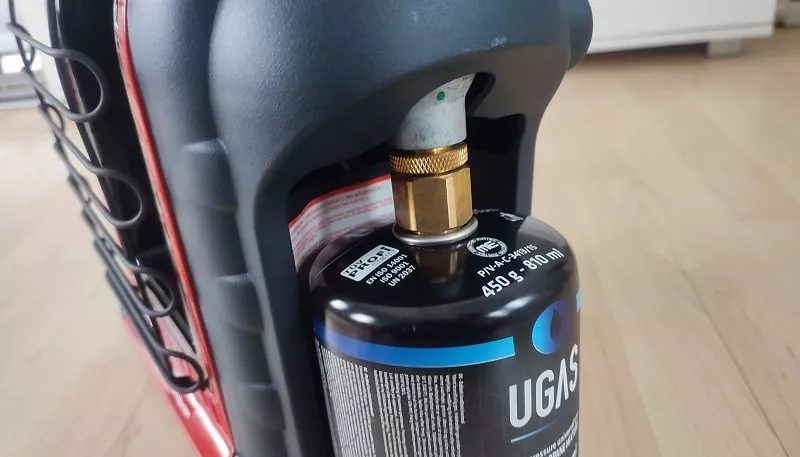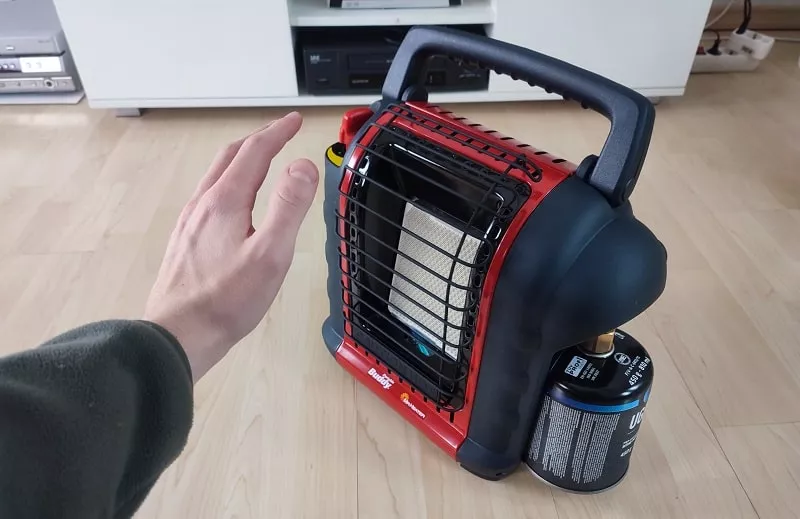Your propane heater is making noises and you don’t know how to fix it, or if the noise is normal? In this article, we’re going to check all of the common propane heater noises!
After reading this article, you’ll know exactly where your heater’s noise comes from and whether you can do anything about it.
For each noise listed, you’ll find a way to test for and fix the respective noise.
Quick answer: Some propane heater noises such as clicking and crackling are normal. They come from the thermostat switching the heating settings, and from the parts heating up. Other sounds such as knocking, gurgling, and hissing are signs of propane leaks, air in the heater’s gas line, and the propane flame not burning properly. These need to be fixed.
Let’s have a look!
Summary of propane heater noises
Before we dive into all of the fixes, here’s a quick look-up table with the noises we cover in this article.
| Propane heater noise | Reason | Is it dangerous? |
|---|---|---|
| Clicking | Thermostat or protection mechanism switches heat setting | No |
| Crackling | Heater parts heat up and expand | No |
| Knocking | Incomplete propane burn | Yes |
| Gurgling | Propane tank is overfilled and gas has no room to boil | No |
| Humming | Air trapped in gas line | No |
| Hissing | Propane gas leaking | Yes |
How to fix your propane heater making noise
Here’s the list of propane heater noises and their fixes!
1. Clicking
Some propane heaters occasionally click. The reason for a clicking noise in a propane heater is usually a built-in function to shut off the heating.
This could be a thermostat, an automatic shut-off timer, or an overheat protection.
Most thermostats regulate the heating smoothly, meaning they slowly adjust the heat output based on the room’s temperature. But some simpler thermostats use a two-point control algorithm.
This is a temperature control algorithm that knows only two settings (the two points): Heater on and heater off.
A propane heater often produces this clicking sound when the heater switches the heat setting from on to off or vice versa. This could be caused by a built-in relay or a clicking of the closing or opening gas valve.
How to test: You can easily test whether this is the cause of your propane heater’s noise by running your heater on full power and observing it. When there’s a clicking sound, does the heat output of your propane heater change?
For example, a heating panel could shut off or turn on.
If yes, then the clicking is due to a built-in temperature control mechanism, such as a thermostat or an overheat protection.
There’s nothing to worry about and your heater is working as expected.
How to fix: There’s no reasonable way to fix the clicking sound caused by a thermostat or overheat protection of a propane heater.
However, there’s also no need to fix the clicking sound. Occasional clicking is expected and your heater is working just fine.
2. Clicking when you carry the heater
Portable propane heaters oftentimes have a built-in tip-over protection. The built-in tip-over protection automatically shuts off the heater when it is tilted beyond a certain angle.
Usually, a tip-over protection is a simple metal weight that tips in either direction and touches a metal contact when you tip over your heater.
Tip-over protection could also be a long button on the bottom of your heater. As long as it’s standing on the floor, the tip-over protection button is pressed. But when you tip over your heater, the button is released and signals the heater to stop heating.
If your heater’s tip-over protection is a metal weight then it makes a clicking sound when it hits the metal contacts.
How to test: Lift your portable propane heater and tilt it in different directions. If it has weight-based tip-over protection, then it makes a clicking sound.
This oftentimes causes people to worry about their heater having loose internal parts. But that’s not the case.
How to fix: There’s no way to fix the clicking of tip-over protection. The protection mechanism makes a clicking sound and this is expected.
 Propane heater with tip-over protection activated
Propane heater with tip-over protection activated
3. Crackling
Propane heaters reach very high temperatures. That’s why, after you light a cold propane heater, the parts heat up and make crackling sounds.
The reason is that the heat causes the individual parts of your propane heater to expand. The expansion causes pressure and friction to build up between parts. Some parts slip by their neighboring parts for a fraction of a millimeter.
Even if you can’t see these micro-movements, they do make noise, which you perceive as crackling.
It’s similar to the crackling in a fire. Even though the individual wood logs don’t move, they crackle as the fire burns. ( This comparison is not ideal, since fires also involve mini gas explosions, but I hope you get the point anyways )
Maybe a better comparison would be a cold wood stove crackling when you light a fire inside.
How to test: Light your propane heater. It should crackle after a few minutes. This is a sign that its components heat up.
How to fix: Also here there is no fix to be done. The crackling is expected and does not indicate a malfunctioning of your heater.
4. Knocking
Knocking sounds are the first real issues in a propane heater. Your propane heater makes a knocking sound when the flame does not burn properly.
This could potentially cause your propane heater to emit carbon monoxide.
It could even be that the flame disappears and lights again after a fraction of a second. This reignition or half-burning of gas can cause a knocking sound.
It’s as if your propane heater’s flames gasp for air.
The reason for the knocking sounds is likely an out-of-balance propane-to-air ratio.
How to test: Ignite your propane heater. Check the pilot light’s flame. Is it blue or yellow? If the flame is yellow, even if it’s only partly, then that’s a sign of an improperly adjusted propane heater.
How to fix: You can look up online (or in your propane heater’s manual) how you can adjust the oxygen intake of your propane heater.
Then, adjust the oxygen intake until the gas flame is blue.
If you don’t want to do that yourself, you can also hire a technician to do it for you.
5. Gurgling
Gurgling sounds usually come from the propane gas and its state transition from liquid to gaseous.
When the liquid propane gas leaves your propane tank, it decompresses and becomes a gas.
When you open your propane tank gas valve, the pressure inside the tank reduces and propane gas leaves. The pressure reduction causes liquid propane to boil inside the propane tank.
Propane tanks should always be filled to no more than 80% of their volume. That’s to leave space for the boiling to take place.
If your propane tank is overfilled, then this could cause very high pressure inside your propane tank. And after opening your propane tank, the liquid propane and propane gas mix start boiling right in front of or even inside your gas hose.
This causes the gurgling sound.
How to test: Open the gas valve of your propane tank and see if it makes a boiling sound. You can even try to open it outdoors without the heater connected to exclude the gurgling sound coming directly from your propane heater. Just be aware that this will waste a bit of your propane.
How to fix: Ideally, you should reduce the fill level of your propane tank. To do this, you could either fill another propane tank from your main tank. Or you could just blow out your propane (which would, however, be very wasteful).
My suggestion would be to keep using your current propane tank with your propane heater. Even if it makes a gurgling sound.
If the fill level of your propane tank is the issue, then the gurgling should stop after a few days of using your heater (once you reach fill levels below 80%).
Running a propane heater on a gurgling propane tank is not dangerous.
So, this issue usually resolves itself.
6. Humming
Humming noise in a propane heater or a propane tank is a sign of vibration. A common cause for vibration in a propane heater is air trapped in the gas hose or the gas regulator.
The air bubbles trapped in your heater or tank start vibrating because of the gas flow which excites the vibration.
How to test: Turn on your propane tank. Does it make a humming noise?
How to fix: To fix the humming noise, you have to bleed the propane line of air.
The simplest way to purge all the air is to hold down your pilot light button for 1 to 3 minutes. A bit of gas will leave through the pilot light’s opening. But this should refill your gas line with propane gas and thus reduce the humming noise.
How to prevent it: To prevent this issue from happening in the future, you should make sure that the gas hose, the gas tank, and your propane heater are connected tightly.
There should be no way for air to enter the system. If you’re not sure about your connection strength, you can tighten the connection with a wrench.
Then you can check the seal of the connection by putting a water and soap mixture (or your spit) on the connection. If gas leaks, bubbles will appear.
7. Hissing
A hissing sound is always a sign of a gas leak! Gas leaks are very dangerous since they can fill your living space with ready-to-explode gas.
Normally, gases are scented, so you should notice leaks by smell as well. If you don’t smell anything, the leak in your propane heater is likely very small.
How to test: Turn off your propane heater. Disconnect the gas tank from the heater. Do you still hear a hissing sound?
If yes, then the issue is either with your gas tank or the gas hose.
If not, then connect your heater, but don’t turn it on yet. Is there a hissing sound now? If yes, this would indicate a leak anywhere in your propane heater.
If there’s still no hissing sound, light your propane heater. Do you hear the hissing noise now? If you only hear a hissing noise in a running propane heater, then you are safe. The noise you are hearing is the sound of gas flow and is expected.
When I run my Mr. Heater Buddy propane heater, I hear a hissing sound on the low heat setting, but not on the high one. But this is expected.
How to fix: If you hear a hissing noise when your heater is disconnected, then you should replace the propane tank with a new one!
You can try to hear if the hissing noise happens with a gas hose connected only or even when it’s disconnected. When the gas tank makes a hissing noise on its own, immediately carry it outdoors, since it leaks gas!
Also, get a new hose. The connector between the tank and the hose might be damaged.
But if you only hear the hissing sound when your heater is connected, then the fault is in your propane heater. And in this case, I recommend getting a new heater, such as this Mr. Heater Buddy(click to see my review).
 Propane heater with a screw-on bottle. Hissing noise comes from an improper connection between propane tank or bottle, and the propane heater.
Propane heater with a screw-on bottle. Hissing noise comes from an improper connection between propane tank or bottle, and the propane heater.
What if your propane heater is making a different noise?
After checking all the possible issues and fixes in your propane heater, it still makes a noise? Or the noise your propane heater is making is not on this list?
In this case, I would assume that your propane heater has a different special issue.
It’s likely not dangerous, because propane gas leaks always make a hissing sound.
A different noise could come from old materials making weird noises, grease on your propane heater burning (which would produce a yellow flame), or there could be insects inside your propane heater.
In this case, I recommend you check your propane heater again. Make sure that all the parts are clean, the pilot light flame is blue and your propane heater does not contain any loose parts that cause rattling noises.
Tighten all the screws in your propane heater.
If it’s still making noise now, then I recommend you get a new propane heater.
My favorite model is this Mr. Heater Buddy (click here to view it on amazon).
